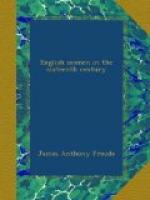But how could it decently be done? Bishop Jewel relieved the Queen’s mind (if it was ever disturbed) on the moral side of the question. The bishop held that it would be meritorious in a high degree to intercept a treasure which was to be used in the murder of Protestant Christians. But the how was the problem. To let the privateers take it openly in Plymouth harbour would, it was felt, be a scandal. Sir Arthur Champernowne, the Vice-admiral of the West, saw the difficulty and offered his services. He had three vessels of his own in Conde’s privateer fleet, under his son Henry. As vice-admiral he was first in command at Plymouth. He placed a guard on board the treasure ship, telling the captain it would be a discredit to the Queen’s Government if harm befell her in English waters. He then wrote to Cecil.
‘If,’ he said, ’it shall seem good to your honour that I with others shall give the attempt for her Majesty’s use which cannot be without blood, I will not only take it in hand, but also receive the blame thereof unto myself, to the end so great a commodity should redound to her Grace, hoping that, after bitter storms of her displeasure, showed at the first to colour the fact, I shall find the calm of her favour in such sort as I am most willing to hazard myself to serve her Majesty. Great pity it were such a rich booty should escape her Grace. But surely I am of that mind that anything taken from that wicked nation is both necessary and profitable to our commonwealth.’
Very shocking on Sir Arthur’s part to write such a letter: so many good people will think. I hope they will consider it equally shocking that King Philip should have burned English sailors at the stake because they were loyal to the laws of their own country; that he was stirring war all over Europe to please the Pope, and thrusting the doctrines of the Council of Trent down the throats of mankind at the sword’s point. Spain and England might be at peace; Romanism and Protestantism were at deadly war, and war suspends the obligations of ordinary life. Crimes the most horrible were held to be virtues in defence of the Catholic faith. The Catholics could not have the advantage of such indulgences without the inconveniences. The Protestant cause throughout Europe was one, and assailed as the Protestants were with such envenomed ferocity, they could not afford to be nicely scrupulous in the means they used to defend themselves.




